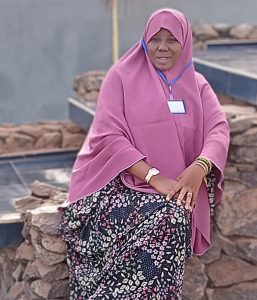Son’s jaundice at birth prompts data scientist’s research journey to help others
7 July 2023
Serifat Folorunso’s motivation for entering the health data research field came after the birth of her second son. With her son presenting with jaundice, Serifat had many questions for doctors about why it had occurred. It was not until studying her Master’s degree in Statistics at the University of Ibadan, Nigeria, that Serifat had the opportunity to initiate research through statistical modelling on the condition.

Over her two-year Master’s course, Serifat used clinical data and biological information for research to help predict which babies would present with jaundice at birth.
She says: “When my son was hospitalised and many years after, I kept wondering why he was jaundiced at birth. So, I started my own research. There weren’t many internet cafes at that time where I could access the web. When I started my Master’s degree, I decided to include some statistical modelling on the condition to help improve care.”
Serifat’s paper analysed variables to determine whether they could influence the outcome of a given trial.
Her paper used case notes of 232 newborn children, presenting with neonatal jaundice, to formulate a model that can be used by health professionals to predict the probability of neonatal jaundice at birth.
It is hoped that findings from the research will transform the care of mothers identified at risk of having a child with jaundice as well as identifying the best ways to treat the babies.
After her Master’s, Serifat undertook a PhD in Statistics from the University of Ibadan, Nigeria, specialising in the cure fraction – the proportion of patients cured of a disease – of patients with ovarian cancer.
Data from these studies is of interest to patients and doctors and is a useful measure to monitor trends in survival rates of curable diseases.
She explains: “After I had an ectopic pregnancy, I found myself being drawn to researching conditions relating to women – which led me to research female reproductive cancers to help improve the outcome for other women. It’s been really exciting for me to see progress in this area. I just love what I am doing!”
Serifat then used her knowledge and experience working for seven years as a consultant at the University of Ibadan Laboratory for Interdisciplinary Statistical Analysis with a primary interest in applied statistics in the biomedical, health, and environmental sciences.
Here she used a collaborative approach to explore several theories including Environmental Degradation in Nigeria: The Challenges of Peaceful Co-existence. This study examines environmental sociology, the challenges of poor environmental management and their associated effects on economic and food security, dwindling plant life, land, and water resources, increasing social conflicts, and migration.
Now in the UK, Serifat is studying her second Master’s degree in Applied Data Science at Teeside University while undertaking her internship with IDEMS International through HDR UK’s Black Internship Programme.
“I truly love the teaching methodology in the UK. It’s very comprehensive – and it’s good to collaborate with people from all over the globe.”
Through her placement, Serifat hopes to gain deeper insights about how machine learning and artificial intelligence are applied in the health sector.
“I want to know more about how machine learning algorithms can be used in medical imaging such as X-rays or MRI scans to look for patterns in the population. And more coding software. There’s so much to learn on this subject.”
Working and studying in the UK has been quite an eye-opener for Serifat especially when she looks back at the PhD she undertook in Nigeria.
“Working on an academic research piece is not as easy as in the developed world,” she continues. “You don’t have access to research forums or materials, and there are less conferences where to meet clinicians and biostatisticians. But I’ve been quite proactive to learn more.”
Serifat is hoping to secure a job in the health data field after her placement with IDEMS to continue advocating for the ethical use of health data to improve the health outcomes for people globally.
“I just started my internship, but already I have so many ideas. I’m really passionate about this work,” she says “I have experience of working on women and children’s health research but I have many other interests that I can’t wait to pursue!”
Reflecting back on her journey in health data, Serifat can see how far she has come.
She says: “When I was doing my undergraduate degree in Mathematical Sciences in Nigeria, there were only two women in about 70 students. It’s so great to be a part of a programme that champions diversity of ethnicity, gender and age.”



